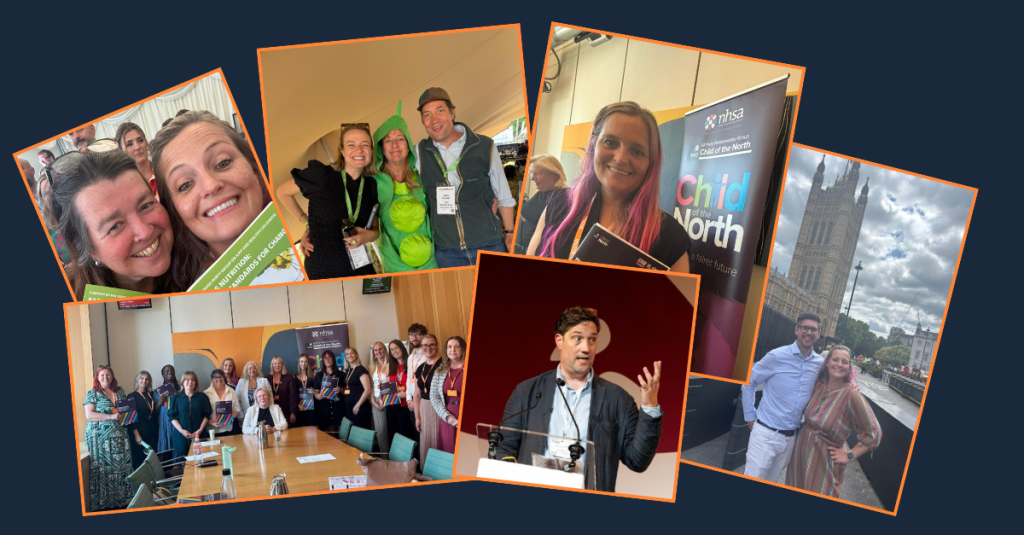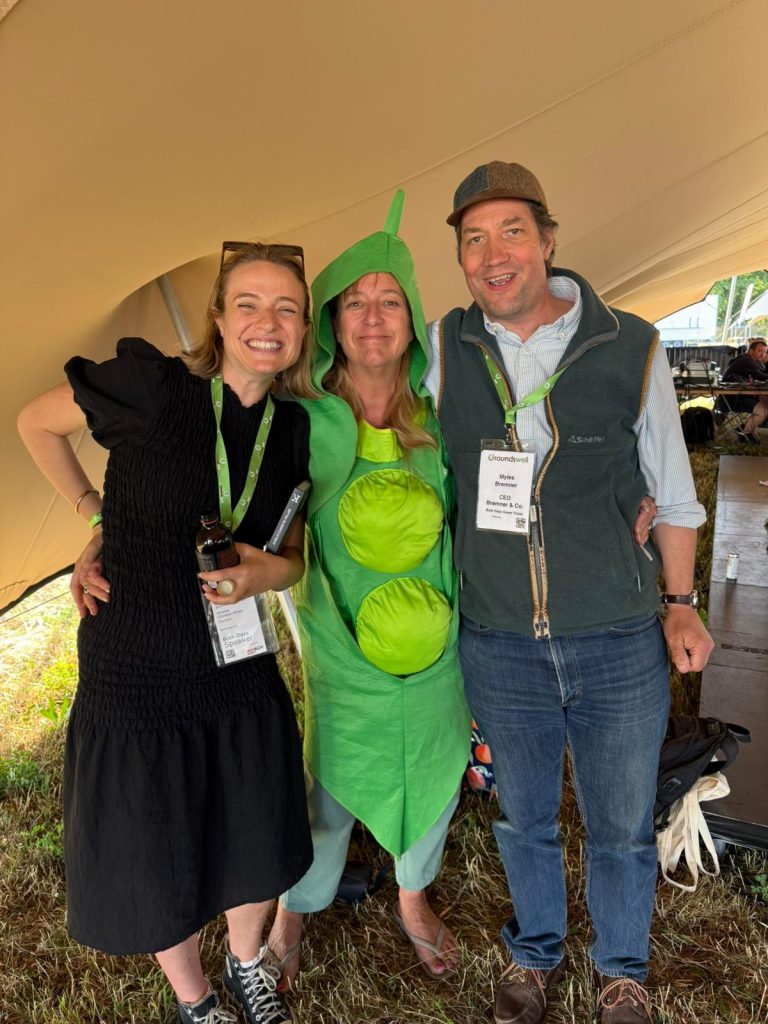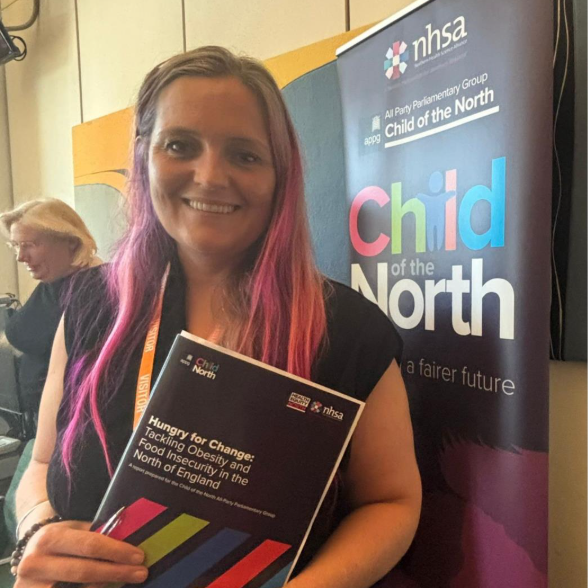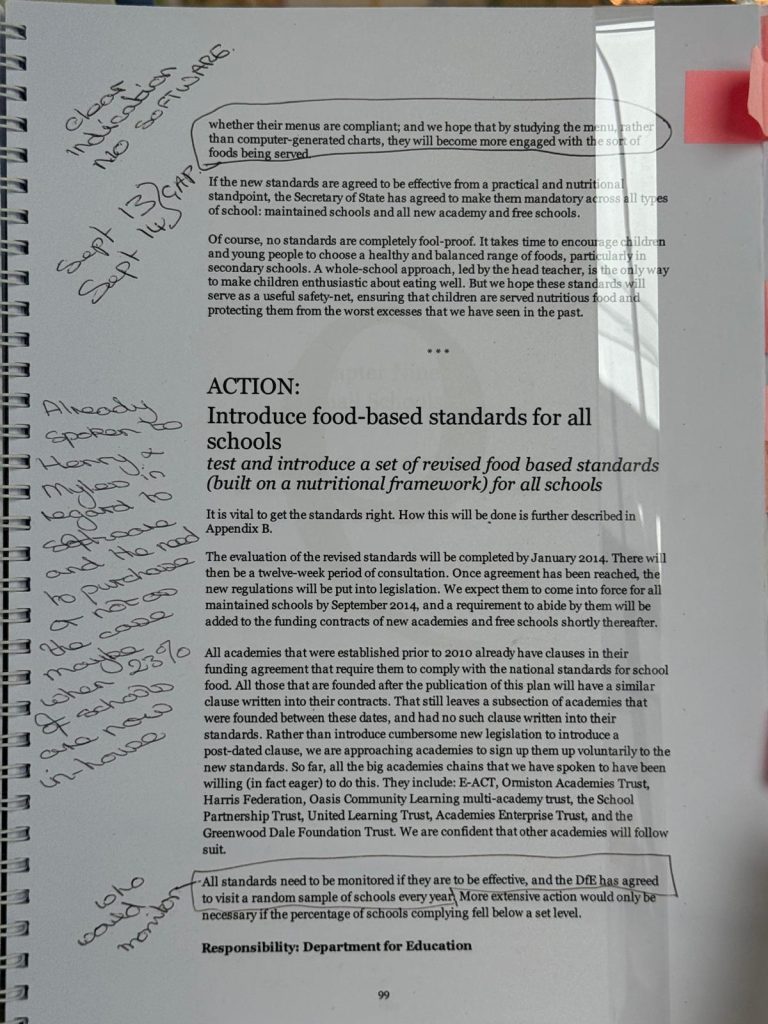
From farmer’s fields to Westminster corridors, July’s events gave us space to connect, share ideas, and push forward conversations on food, education, and early years. We’ve gathered the highlights from a month that showed, once again, how change is built in meetings, in kitchens, in fields, and in communities.
Groundswell
2 July
Lannock Farm, Hertfordshire
Myles joined farmers, growers, researchers, and policymakers for Groundswell, the UK’s leading festival of regenerative agriculture. In a lively food education session, Richard Dunne captured the room with a simple truth: “If you help children fall in love with nature then they’ll always look after it.” The day was as much about connection as content, breaking bread with new friends, joining in the #beansmania celebrations, and exploring how schools could harness the nutritional and environmental potential of pulses. Here’s one idea that resonated with many; if every school served just one portion of beans a week as the main source of protein, it could add up to 200 million portions a year, a huge boost for UK bean production, and a tangible way to link farm-to-fork thinking with school menus.

What has “Free School Meals” measured and what are the implications?
3 July
Education Policy Institute / Nuffield Foundation
Myles, Rosie, and Abigail joined a deep dive on the latest EPI and Nuffield Foundation project, which explores how Free School Meals have been used as a measurement of child and family circumstance and how this has shaped policy ambition. In collaboration with colleagues from across the sector, workshops provided the space to explore both the opportunities to enhance FSM’s value as a measure, and potential alternatives that could lead to more effective and equitable outcomes. Myles was able to talk to the work that we’ve done at Bremner & Co on supporting local councils with local ‘opt-out / auto-award’ processes (sometimes known as local FSM auto-enrolment), as well as contribute to what policy changes are needed at national level.

Early Years Nutrition in Southwark and Lambeth Settings – Sharing Early Findings and Exploring Next Steps for Policy
7 July
Early Years Food Coalition
Dayna, Rosie, and Harry organised and hosted this webinar as part of the work of the Early Years Food Coalition. The findings from forthcoming research undertaken by Sheffield Hallam University in Southwark and Lambeth were presented by Dr Jo Pearce (RNutr) and Claire Wall (RNutr). They covered how health inequalities shape nutrition in the early years, the gaps between perception and reality when it comes to food quality, and the implications of DfE updates to nutrition and funding guidance for early years settings. In attendance were national and local government representatives, public health teams, early years practitioners, and advocates and NGOs. We were proud to have helped to create this space for practical discussion: from menu planning and workforce training to how local and national policy can better align. Feedback from attendees was energising, with many calling for clearer standards and more consistent funding to embed good practice.

Child of the North APPG Report Launch
8 July
Child of the North APPG, Parliament
Dayna attended the parliamentary launch of Hungry for Change, the latest Child of the North APPG report, alongside our brilliant colleagues, Emily Fallon from Essex County Council and Dr Kay Aaronicks. This report traces children’s health and nutrition from pregnancy through adolescence, exposing stark inequalities for children in the North of England, from higher obesity rates to greater exposure to fast food outlets. The report also features Dayna’s co-authored chapter on early years, which calls for measures such as universal Free Early Years Meals, stronger Healthy Start provision, and a dedicated Minister for Early Years Food and Health.
At the launch, Dayna and Kay shared insights from the Nourishing our Future project, stressing the importance of food in early years settings and the need to see child nutrition as a life-course issue, from breastfeeding through to further education. The most powerful moments came from Food Foundation ambassadors, especially teenagers, who spoke openly about their experiences of food insecurity, bringing the statistics to life and underscoring how food will be of central importance in addressing regional inequalities.

LACA Main Event
9 July
LACA, Birmingham
Myles joined school caterers, suppliers, and policy leaders at the LACA Main Event, the annual gathering for the UK school meals sector. He presented our Follow the Carrot research and contributed to a panel discussion on the value and challenges of local sourcing. The panel, with Bethan Cowell (NFU), Cathy Amos (Love British Food), and Katie Palmer (FoodSense Wales), explored the government’s ambition for 50% of public sector food to come from UK or local sources. While the benefits for sustainability, resilience, and local economies were clear, the discussion didn’t shy away from the funding pressures that make this target a tough ask for operators whose first priority is getting nutritious food on the plate. Alongside the discussion, the event offered a chance to see new approaches in catering and procurement, with the exhibition floor buzzing with ideas and practical innovations.

Childcare and Early Years Reform Conference
10 July
Dayna attended a high-level conference on Childcare and Early Years reform, bringing together government, sector leaders, and practitioners. Dayna made sure to bring nutrition into the discussions, asking questions to the panel about what their plans were for advocating for early years nutrition in settings and how we work together to make sure food in early years is central to the government’s early years funding review next year.
With reform moving at pace, much of the discussion centred on how to protect quality, including the role of nutrition and healthy eating in early childhood development. There was a shared sense that policy shifts must be matched by investment in people, training, and standards if they are to deliver lasting change.
Sustain Summer Reception
10 July
Sustain
Myles and Rosie joined members of the Sustain Alliance, food and farming sector representatives, and policymakers at Regent’s Park Allotment Garden for Sustain’s Summer Reception, which was a welcome chance to step away from the desks and celebrate collective wins. Against the backdrop of a busy year for food policy, conversations flowed on what’s next, from deepening collaboration, to ensuring the momentum on free school meals translates into broader systemic change.
Alongside catching up with friends and colleagues from across the sector, this event provided a moment of reconnection. It was a return to the ‘Capital Growth space’, where, in 2012, Myles chaired the Sustain/Mayor of London project to create 2012 new community growing spaces as part of the London Olympics legacy

A New Era of Integration in the Early Years
15 July
Nesta
Cressida attended Nesta’s exploration of integrated early years services, where case studies showed how bringing together health, education, and family support can transform outcomes. Food and nutrition were not separate topics, but woven into examples of holistic provision reinforcing the point that healthy eating is a core part of child development, not an add-on.
Early Years Nutrition: Setting the Standard for Change
16 July
Cross-Party Group on a Fit and Healthy Childhood, Parliament
Dayna joined colleagues from across the early years and public health sectors to attend the launch of Early Years Nutrition: Setting the Standards for Change. As well as highlighting the important role of early years settings in feeding under 5’s, this report shone a spotlight on the nutritional quality of commercial baby foods and the role these products play in shaping lifelong eating habits. Presentations highlighted concerns about high sugar content, limited texture, and misleading health claims in many products aimed at infants and toddlers. Speakers stressed the need for clearer labelling, better consumer information, and early introduction of varied textures and flavours to support healthy development. The discussions were a timely reminder that the first foods children encounter can set the tone for their relationship with food for years to come.

School Food Exhibition
17 July
School Food APPG
Hosted at the Food Museum, the School Dinners Exhibition offered a journey through the political, cultural, and economic story of school meals in the UK. Myles joined MPs, campaigners, and school food champions to explore the displays, from an Eton College dinner plate to Jeanette Orrey MBE’s collection of school food memorabilia. He was surprised to see this collection included an infamous and well-thumbed 2013 School Food Plan with margin notes and Myles’ own name. The event, organised by Sharon Hodgson MP and Luke Hall MP, was a reminder of how deeply school meals are woven into the national psyche; a common denominator across generations. Over a delicious school food lunch prepared by David Thomson and team, conversations turned to how policy can protect and strengthen this tradition. For us, it was also a chance to connect with long-standing allies and reflect on the history that informs today’s debates on universal provision.

Food Foundation 10th Birthday Party
17 July
The Food Foundation
Myles joined campaigners, researchers, and policymakers at the Hackney School of Food to celebrate a decade of The Food Foundation. The evening offered a chance to reflect on the work The Food Foundation have done so far, and the enormous impact they have had in putting food policy firmly onto the political and social agenda. The evening was as much about the future as the past, with conversations turning to current projects, the next big policy goals and ruminating on how to sustain momentum in an ever-shifting political landscape.

What now for Free School Meal registrations? The role for local councils in driving uptake
22 July
Local Government Association
Myles chaired and presented at this Local Government Association webinar, which brought together councils from across the country to discuss why FSM auto-enrolment is such an important topic right now. The webinar covered the national policy context surrounding FSM auto-enrolment, as well as the impact of the Government’s extension of FSM eligibility to children from households in receipt of Universal Credit. We heard about the practical and strategic implications for councils regarding local delivery and innovation of registration processes like auto-enrolment. Presentations from the implementation teams at Stockton-on-Tees and Devon shared real experience with implementing FSM auto-enrolment in two different councils, the challenges they faced and opportunities they found, and the lessons they had for councils looking to follow suit. It was a space of shared learning. A chance to hear the latest evidence, learn from peers, and discuss what councils can do today to drive higher FSM uptake locally.
We look forward to sharing where we’ve been next month and continuing this vital conversation.
Written with support from Tessa Goodman.
